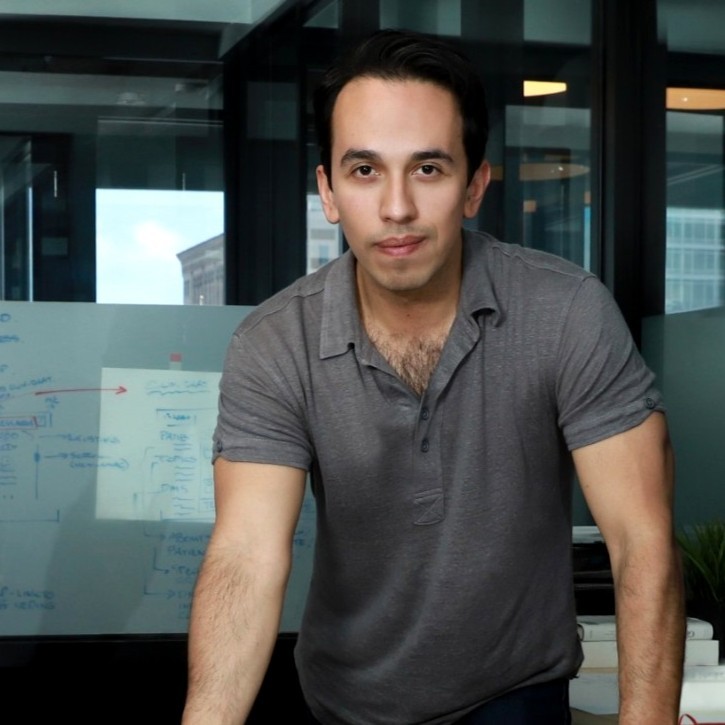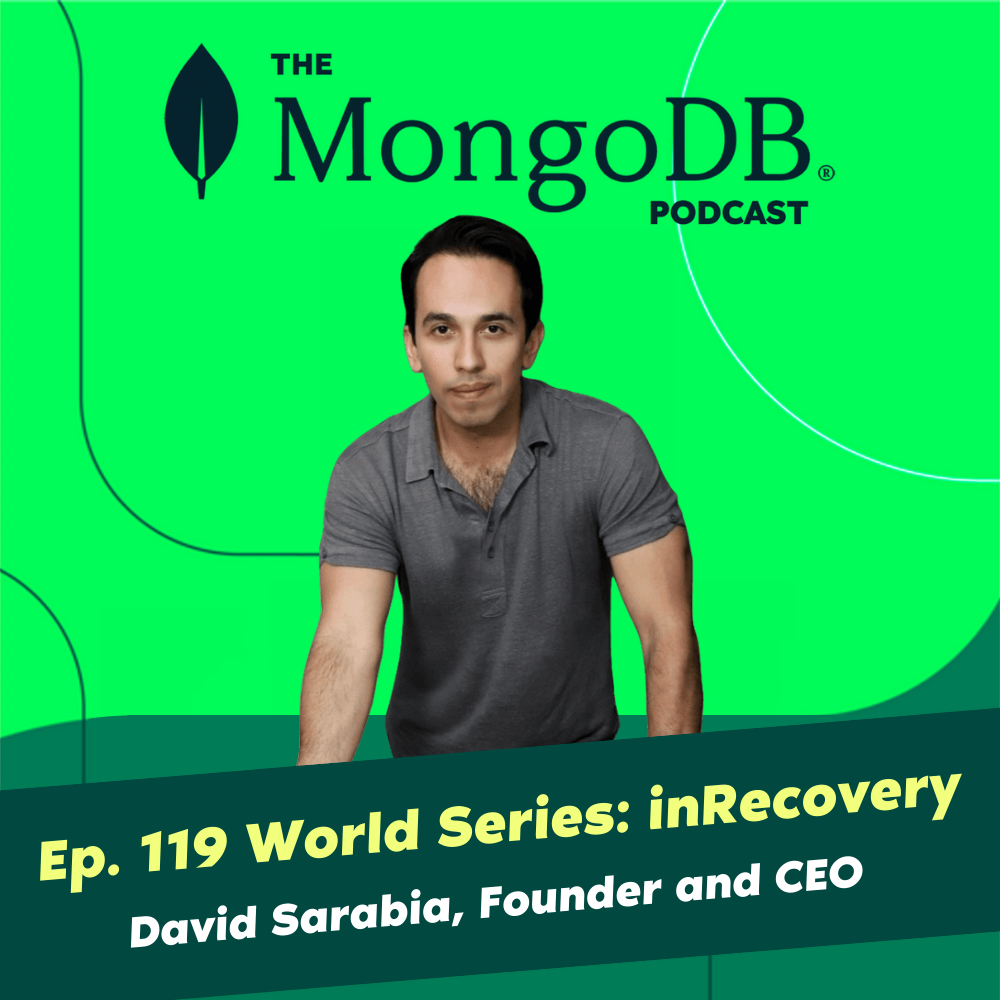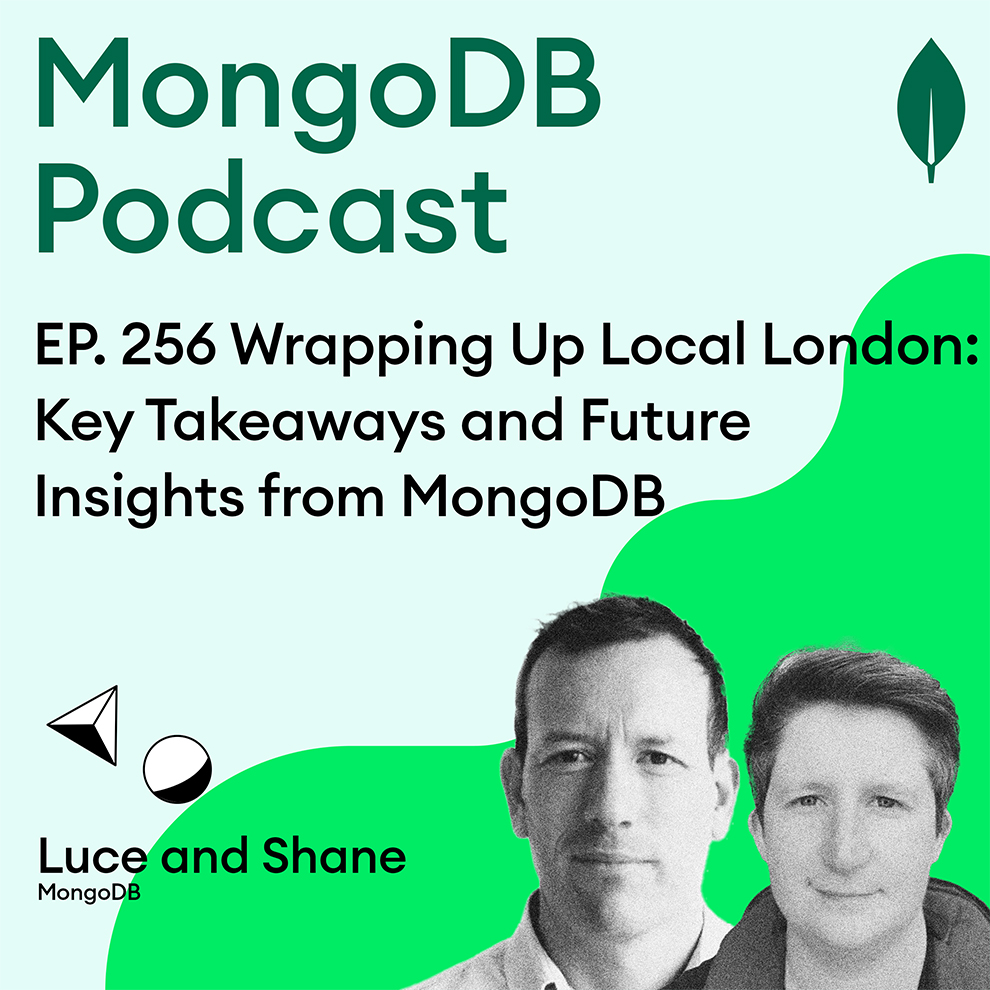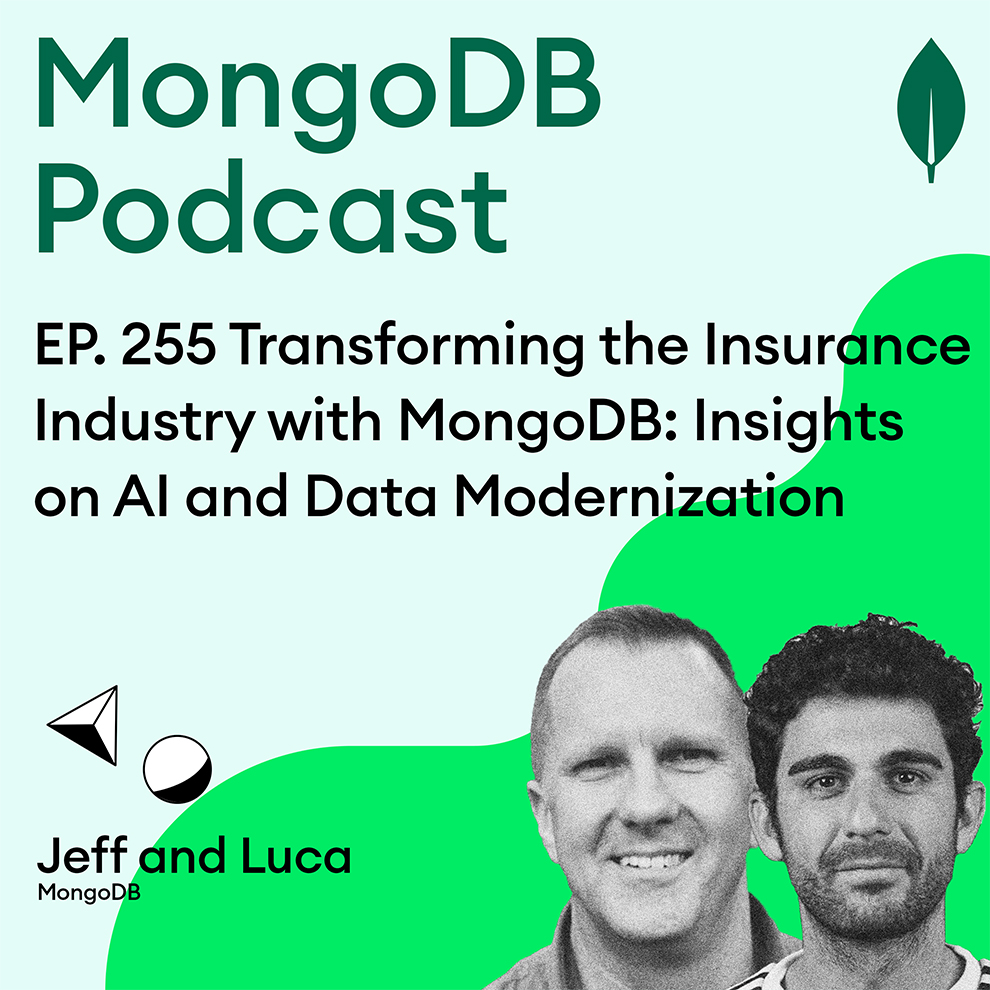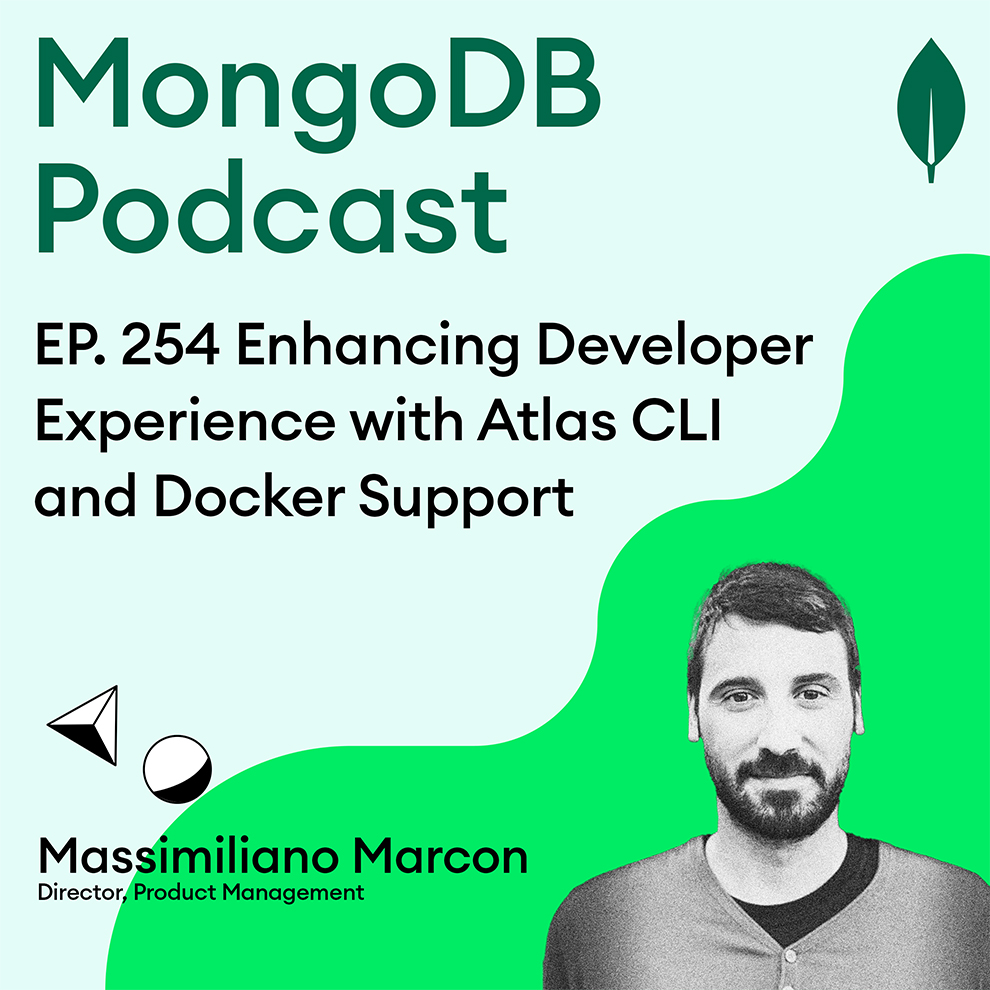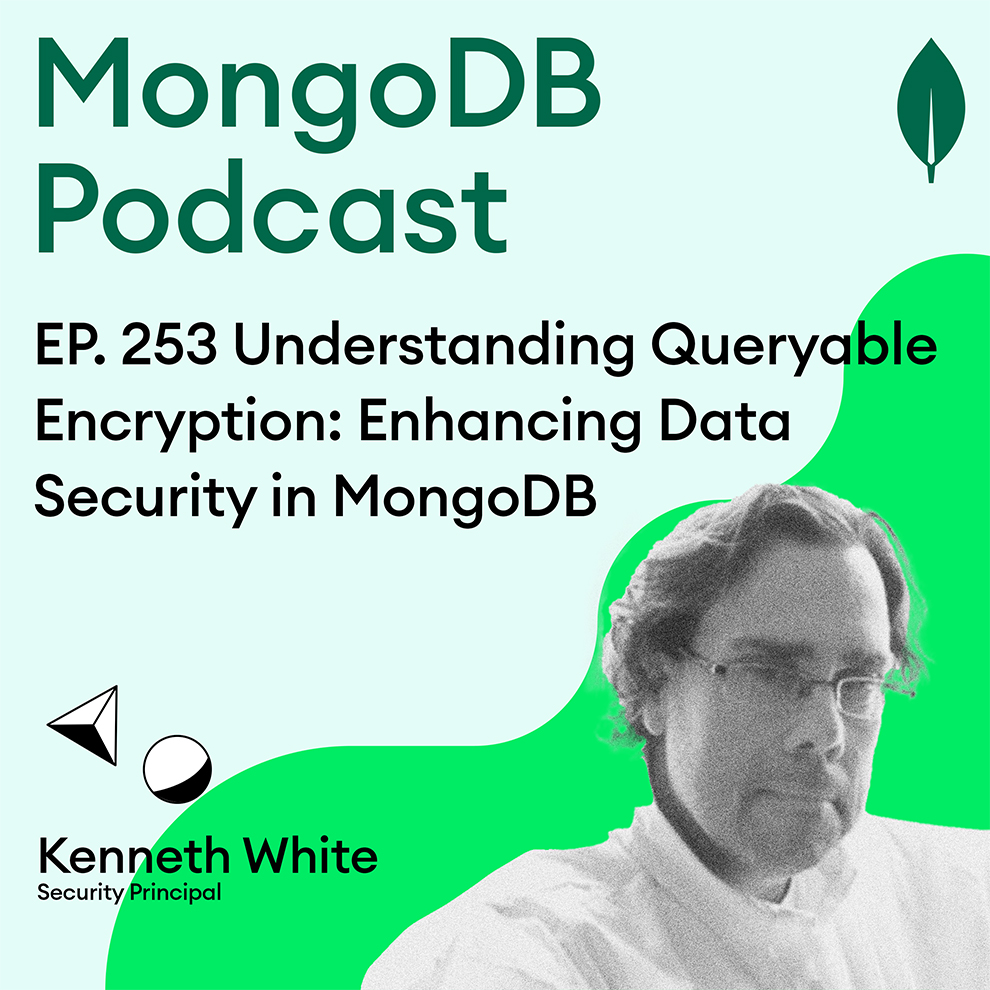Ep. 119 The MongoDB World Series - David Sarabia From inRecovery
- 0.5
- 1
- 1.25
- 1.5
- 1.75
- 2
Shane McAllister: So welcome to the podcast. Again, I'm Shane McAllister. I'm a developer advocate here at MongoDB, and this is another one of our podcasts that were recorded at MongoDB world earlier on in June. This is episode four. As usual, I have a counterpart here with me today, but the difference this time is I'm actually in the same room as Cedric. Cedric, how are you?
Cedric: Hey Shane, I'm doing fantastic. Really happy to be here as we're in Vegas right now, right?
Shane McAllister: Yeah. It's a hard life for you as an intern. So we are in Vegas for a product and marketing offsite for MongoDB, which is great because we've all put down two and a half years of not meeting in person. So this has been a fabulous opportunity to meet everybody. But more important, it's been a great opportunity to be able to record this podcast. And I think this podcast above all is very interesting from the point of view that it has a very human element. I certainly enjoyed listening to it. And this podcast is a real human story. It's an interview with David Stravia, again by Michael Lynn. And Michael Lynn is actually also in the room, which we were delighted to have. Hey Mike.
Michael Lynn: Hey, it's great to see you in person, good to be here.
Shane McAllister: Yeah, it's brilliant to be here in person. And I think of all of the ones of the podcast that we're recorded on the world show floor, this is obviously super interesting. Yes, they use MongoDB, but they're tackling something that is very kind of sensitive, dare I say it, but they're putting a technical approach to it to remove the stigma.
Michael Lynn: Yeah. And it kind of hits home for me. This is an interview that I really loved the time I spent with David. David is the founder of inRecovery, and inRecovery is an organization that seeks to help those in recovery, but also the family members. And one of the things that we strive to do with MongoDB is make it matter. So we love to help startups and folks that are starting businesses that have real world impact, and inRecovery is one of those. So it does get a little deep into the mission and purpose of inRecovery, kind of hits home for me because I am a person in recovery. So David and I get pretty deep into a discussion about recovery and what that means from a personal perspective. But again, bringing it back to the mission of the podcast and the mission of MongoDB to make better developers and to really make it matter, I think that hits on all cylinders. It's a really interesting story and I really appreciate David spending some time with me.
Shane McAllister: Yeah. And what I took out from it, and you're going to hear it directly from David himself, is that he is not just in this, he's a serial entrepreneur, but he's not in this for the money. He's found a purpose with what he's doing now. And it's great that MongoDB part is part of that journey as well, too. And like one of our previous episodes, Cedric, he was on the startups program as well. So the MongoDB for startups program, which I think we probably see in a few more of these episodes. So I think without further ado, let's listen to Mike on the show floor with David.
David Sarabia: I am David Sarabia, I'm the Founder of inRecovery and good to see you.
Michael Lynn: Yeah. It's great to see you. Well, welcome to the show. It's great to have you on the podcast, David we're recording at MongoDB World 2022, and it's just electric. A lot of great energy here.
David Sarabia: It's New York.
Michael Lynn: Yeah. New York. Welcome to New York. Yeah. So where are you joining us from?
David Sarabia: San Diego, but I actually used to live here. I lived in the city for almost eight years.
Michael Lynn: Oh, fantastic. Okay.
David Sarabia: It's good to be back.
Michael Lynn: Yeah. Well it's great to be here for sure. What are you doing at the conference?
David Sarabia: So I literally just walked in right now. I have no idea. I just randomly strolled in here. No, I'm joking. I did a talk on Tuesday when the conference started with one of your executive architects. MongoDB is one of our vendors for our tech stack and they invited us to, or invited me to come and speak in the make it matter section, which was really cool. It was a lot to do with, much more focused on the social impact that we can have with technology.
Michael Lynn: Terrific. So tell me about inRecovery.
David Sarabia: So inRecovery, just give you some background on myself. So I've been a two time founder, started coding when I was like eight years old because I used to get my butt kicked in school. Computers never kicked my butt. So got very lucky, sold my first company at 25 to Insight Partners. And that now is almost a billion dollar company. It's wild. After 12 years, Insight just sold it twice. After that, I took a bit that inaudible and then Magenta bought us, and I basically didn't have to work anymore. I moved to New York, and New York happened. It became a very quick slippery from a party habit. First time I tried drugs, first time I was" cool," right? And money, and time, and cocaine got in the mix, and that was just disastrous ended up basically homeless on my 30th birthday. Just went through the full cycle of that, with addiction and really just a lot of things I hadn't taken care of with my mental health, I guess since I was young and just kind of happened. But anyway, got back on my feet thankfully. I built a consulting firm and then my best friend unfortunately passed away, since I was 16. And that was, it's actually someone that was probably here at one point. Jay Greenwald, he was the founder of Daytran Media, great guy, super amazing tech investor, just amazing human. We lost him. And that was my wake up call, went to rehab, and that's where inRecovery was born. It was an inspiration from going to treatment and seeing not only the bad things, but all the good things that were going on. You hear a lot. The treatment industry has a really bad rep because of all the fraud that's that's happened in the past. But there was such a great community of caretakers, of clinicians that loved us so much. They were so invested in us. But they had no tools or they were using tools that were in the way, right? Like the very well known electronic medical record interfaces that are just horrible. It looks like Windows 95 software, if that. And it causes these clinicians to kind of get stuck or really have, or you hear this all the time with doctors, they have their back to you. They're not looking at you anymore because they're just entering notes and dealing more with the technology that's in the way than helping them. So anyway, long story short, inRecovery was kind of a way to digitize that industry, to bring data into the mix, to try to understand people at a deeper level, and really enable these clinicians to do a better job with you. And on the flip side, for the patient and the families being more engaged, be more connected to their recovery, and so on.
Michael Lynn: Wow. So who are your customers?
David Sarabia: So we are selling to the hospitals, to the health systems, to the private clinics that have anywhere from a hundred plus patients a month. We try to cater more towards the mid- market enterprise, just since they work better for them. They have the right, I would say infrastructure for something like this. But our long term goal is really to serve the general community, not just the treatment centers. So we really are trying to create the biggest data sources ever existed for addiction and mental health, so that we can help discover innovations, can help make things more efficient, and really understand what type of treatment works best for you, for me, for the person over there, because we're all so different, we're all very individual. And we really strongly believe that if we can get to the point where we understand what works for who, or at least have strong assumptions of what might work for who, that we can then also help reduce the cost of care and make it more accessible. Because it's extremely expensive. It's a right. It's not a privilege in this country to go to treatment. It costs about 30 grand a month, which is wild. That's very unattainable, I would say, unless you have insurance, and you still have a job or have money. If not, you're going to end up in jail or dead. That's kind of sad, unfortunately. So we really are aiming long term to enable remote treatment processes, but that are truly data driven, truly science based, and effective. And maybe not from ourselves, but through partners, partner providers that might provide that.
Michael Lynn: So I guess it comes down to data, capturing data, making that data available. And you mentioned make it matter. That's a core value of MongoDB's. And how did you, how did you get involved with MongoDB? How was MongoDB brought into the mix?
David Sarabia: That's a really good question. Like I said, I'm, I'm a tech guy forever. And for me, when I was looking at solutions, my first business we were an Oracle shop. Oracle was literally a part of our margin. It was wild how much money we were spending there. But anyway, it worked. It worked great for that use case. But for healthcare, when we were looking at building this company, we understood quickly that we're going to be dealing with all types of data, data that is very fragmented, that is sometimes not standardized. You do have standards like FIRE and Formation 7, but it's very rare that there's interoperability in this industry. It really was, when we were looking at having a much more flexible schema, MongoDB came up and we actually came through your startups program back when Francesca was here, which we all love. It's been an awesome relationship with you guys. And Sig who was my co- speaker-
Michael Lynn: Sig Narvaez?
David Sarabia: Sig Narvaez.
Michael Lynn: And Francesca Krihely.
David Sarabia: Shout out to Francesca, wherever she's at, whoever is lucky enough to have her. So Sig and I became really good friends, beyond just being a system architect for us. I mean a principal architect for us. He's been just tremendously awesome. And we're from the same city, or really grew up in the same place. It's it was just such a great synergy that happened there.
Michael Lynn: Yeah. Fantastic. So we're talking about Sig Narvaez. I guess he's now an executive? Yeah, an executive architect at MongoDB.
David Sarabia: I love his journey though. He founded, I think it was the user group for Tengen back in the day, and then Orange County, and just organically became an employee.
Michael Lynn: And still involved. And still involved in the community.
David Sarabia: That's so cool.
Michael Lynn: Yeah. Just a great guy. Fantastic. So you came up through the startup program. So if you're listening to this and you're curious about that, you can get more information at Mongodb. com/ startups. There's great information there, and startup groups. I used to run the startup group after Francesca left. We provide credits in MongoDB Atlas, as well as consulting from folks like Sig, help get you off the ground, get you up and running. And now how long has inRecovery been on up and running?
David Sarabia: So we've been around for about three and a half years. We're coming up on four years now. And it's been quite the journey as well, as a company getting into healthcare for the first time in my life. I'm an e- commerce guy. And I remember when I first launched it, or was ready to launch within a couple months, I was like," Okay, let's do this. Let's go sell, sell." Thankfully we joined Start of Health who really helped us shape into a healthcare technology company, not just a tech company. I had no idea what HIPAA was. I came in completely ignorant of the space. I would never in my life get into healthcare again, unless I was so passionate as I am with this. There's less stressful ways to make money, I would say. Just the regulation and everything, it's ridiculous. But it stifles innovation, unfortunately. However, it's such a rewarding space. Even after my talk, we had a number of people come up to me and open up about their own struggles with addiction and mental health. And it's just so cool to be in an industry where, or you just, you just feel good, you know you're doing some good in the world.
Michael Lynn: Yeah, absolutely. And it's no coincidence. I'm sober eight coming up on nine years.
David Sarabia: That's amazing, man. That's an inspiration.
Michael Lynn: The world can open up when you address these things. And it's great to see companies like yourself spring up around the concept of helping others.
David Sarabia: It's critical that also people understand, like you said, that it's okay to have a problem and to open up about it. A lot of people unfortunately don't, and they suffer in silence, and a lot of times they perish. So it's so great that the taboo and then the stigma is finally slowly dying down and becoming more acceptable. And one in four Americans have a mental health issue. It's wild. Yeah. Whether it's depression, anxiety, PTSD, bipolar, or whatever it may be. It's very real, and it's really great that now we're finally seeing that kind of acceptance from society.
Michael Lynn: I think it's just wonderful that you're a technologist, and you found success in that lane until you had some personal struggles and were almost brought into this separate lane. And that alone, you're still able to be very successful, but now you're successful at helping others. And that's just a wonderful thing. So really in line with the make it matter core value that MongoDB has. So congratulations on that. Yeah.
David Sarabia: Yeah. Thanks.
Michael Lynn: Truly exciting. So what else would you like the listeners to know about inRecovery?
David Sarabia: So inRecovery, not so much more than what you just said, that it's important that whatever we do in life has some kind of purpose behind it. It's so great to be able to have that drive. And I think one of the messages that I'd like to leave for the audience is that if you know anyone that is struggling with addiction or mental health, if you yourself are struggling, just open up, talk to, email me even, or call me. I've been known to leave board meetings to deal with an issue that's important because it matters that much to me. One of my sponsees went off, and I'm a 12 step guy, and I was sponsoring one kid, and he ended up using heroin, going back to using, and I was in the middle of a board call and I left. Pick him up, give him some chicken soup, took him to his parents. If anybody is listening, david @ inrecovery. org. Just hit me up anytime I'm always available for that kind of stuff.
Michael Lynn: That's an amazing story. Heartwarming. Touches me. That's great. How about advice for folks that are starting a business? You've done it a couple of times.
David Sarabia: If I was younger, I would say," Yeah, go for it. Go for it." But I was actually giving a guest lecture at Stanford once. And one kid came up to me asking me," Should I start a business?" I said," Absolutely not. Don't do it." He looked at me like I killed this cat or something. It was funny. But no, all I would say if somebody wants to start a business, it's really again going back to the theme of making it matter. Make sure it's something actually you're doing more than just for money, because you're going to go through the ringer. It's not easy. It's not for everybody. But if there's a strong purpose behind whatever you're building. It doesn't have to be a social purpose, but as long as there's something, there's an intention that is real from you, and it's authentic, you're going to have a blast. It's the best thing ever. But if you're not invested that much, then it's just hell.
Michael Lynn: Yeah. I get that. So what is success to you?
David Sarabia: I think again that's transformed so much from when I was younger. I grew up poor. I grew up in the ghetto, grew up in the projects actually. Which is funny, because there was like drugs and crime all around me and never touched them until I was older. But success to me before was just money because I grew up without it. And now I would say it's really it's family. Success is being able to wake up in the morning, being happy, having family around you. It's so beautiful and awesome. And I think touching people in a positive way is also a big success, I would say a business- wise. If you're making an impact on someone's life, whether it's their health, their even their productivity, their work, their happiness in general, if you're actually leaving a mark and somebody thinks about your company like," You know what? That actually help me. That was awesome." I can think about a couple tech vendors that are like that, including MongoDB. But yeah, I think that's one of the things I would say that it's important if you're starting anything.
Michael Lynn: Yeah. And I think it's going to vary so greatly depending on what your background is, what your upbringing has been. People define successes, like what you said before. Like just making money, just-
David Sarabia: Right, which is the easiest thing.
Michael Lynn: It's the easiest thing.
David Sarabia: It really is.
Michael Lynn: But when you do make money and that opens the door to actually having an impact on a large number of people's lives, and I know Dave, our CEO, is laser focused on that, expanding the impact of the company.
David Sarabia: That's really great. No, it's really cool to see a lot of these, a lot of big tech companies, you guys are definitely big tech now, doing that and having that kind of a top down approach from leadership. It used to be much more of a grassroots effort where there's a small little division of the company that cares about social impact, but now it's actually coming from the top down, which is really great. And I think guys like Dave, they actually mean it. It's not just a PR stunt, which is really cool.
Michael Lynn: Absolutely.
David Sarabia: What's success to you?
Michael Lynn: It's funny, someone asked me this just last night. What is success? And that's, that's the reason I asked you. I think it comes down to my mission in life, which has expanded from the last eight years. It has to do with, number one, staying sober myself, and that opens the door for everything else that's possible in my life. So staying sober, helping others, and you mentioned that. So stays sober, help others find a better way to be. It's possible. Everything is possible for me, as long as I don't pick up a drink or a drug.
David Sarabia: Same here. I'll just add this. When I was homeless, the thing that actually got me out of it was a random conversation that had actually here on 32nd and Broadway. I was having my morning coffee and this guy and I were just having a conversation about AI, about all things. And he was just in shock that this random homeless guy knows so much about AI. And then we got into cryptography and he was like," What?" I'm a big crypto cryptography nerd. This guy just treating me like a human being was the starting trick. Something happened in my mind that I think I just started remembering who I am and really started caring again. And then what actually really got me out of homelessness was helping others. I started helping other homeless people getting the food, because I actually was still kind of presentable. So it's funny. I actually would go to the buffets, the morning buffets in a lot of these business hotels and just pick up some, couple plates, and then go give it to the guys outside and the families that were outside that were homeless and would probably get kicked out of the entrance of hotels. Talking about appearances, it's so ridiculous. But anyway, that's kind of how I got out of it. It just was helping others.
Michael Lynn: That's a great story. Well, I want to thank you for taking the time. I know that we didn't have this planned and I just kind ran into you on the floor.
David Sarabia: I was about to leave and I just randomly saw you and was like," Hey."
Michael Lynn: Yeah. That's awesome. That's a higher power at work, perhaps.
David Sarabia: Yeah, and you have awesome tattoos by the way.
Michael Lynn: Oh, thank you.
David Sarabia: I know the audience can see it, but those are so cool.
Michael Lynn: They're recovery based.
David Sarabia: No way.
Michael Lynn: Well, so this is a bear, bearing witness. Third step.
David Sarabia: Third step, yes.
Michael Lynn: 417 happens to be my favorite page in a book that you might be...
David Sarabia: Nice.
Michael Lynn: Yeah. It's all about acceptance. Let go, let God.
David Sarabia: Oh, wow. Man, those are super cool.
Michael Lynn: Yeah. It's really something I got interested in after getting sobers.
David Sarabia: Nice.
Michael Lynn: David, thank you so much for chatting with me. Is there anything else that you'd like to share with the audience?
David Sarabia: I would just say check out MongoDB. They're awesome. I'm sure they're users, but specifically Atlas. I really love the fact that I don't have to have a massive team to handle things. It's so great. You pay a little more obviously, but it's so worth it. Big kudos to the Atlas team and what they're building. It's next level.
Michael Lynn: Thanks once again.
David Sarabia: Thanks so much.
Shane McAllister: Well, I certainly enjoyed listening to that. It was once again, another fascinating conversation from the show four. And I know that this is very much a door stopped conversation that was had, but I think it's all the better for it. I thought there was so much in there between using MongoDB because it handles flexible schema really well, because they have to take care of all sorts of non- standardized data, right through to just at the end about whatever startup you might want to do, do it with a purpose. Never for the money. And if you do that, and I think we've seen so many companies like that, they are the most successful ones. So I really, really enjoy that episode. There's more to come. This is episode four, we've got another five episodes. We very much look forward to bringing those to you. There we go. Cedric, we're done again, right?
Cedric: Oh shoot. You know what time it is? So remember as always links are in the show notes, and also please remember to review and subscribe, and stay tuned for our next episode from MongoDB World. So from me, Cedric-
Shane McAllister: And me, Shane McAllister, and-
Michael Lynn: And me, Michael Lynn, it's been a pleasure. Talk to you soon.
DESCRIPTION
In today's episode, a conversation from MongoDB World 2022 with David Sarabia, Founder and CEO of inRecovery. MongoDB Principal Developer Advocate and host, Mike Lynn sits down with David to discuss inRecovery as a platform for fighting addiction, and how the organization is working with hospitals and treatment centers. Along the way the two discuss their history with addiction and sobriety, how they found success by helping others, and how MongoDB and inRecovery work together.
Highlights of the conversation include:
- [04:06] The cycle of addiction and the road to building inRecovery
- [06:34] Mid-market enterprise hospitals and treatment centers
- 08:21] How inRecovery works with MongoDB
- [10:37] Four years of inRecovery and almost 9 years of sobriety
- [13:06] What David wants listeners to know about inRecovery
- [14:12] Advice for folks starting a business
- [15:07] What success means to David and Mike
Today's Host
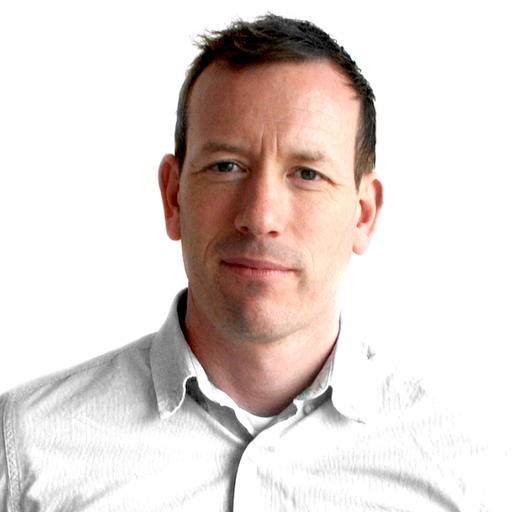
Shane McAllister
Today's Guests
